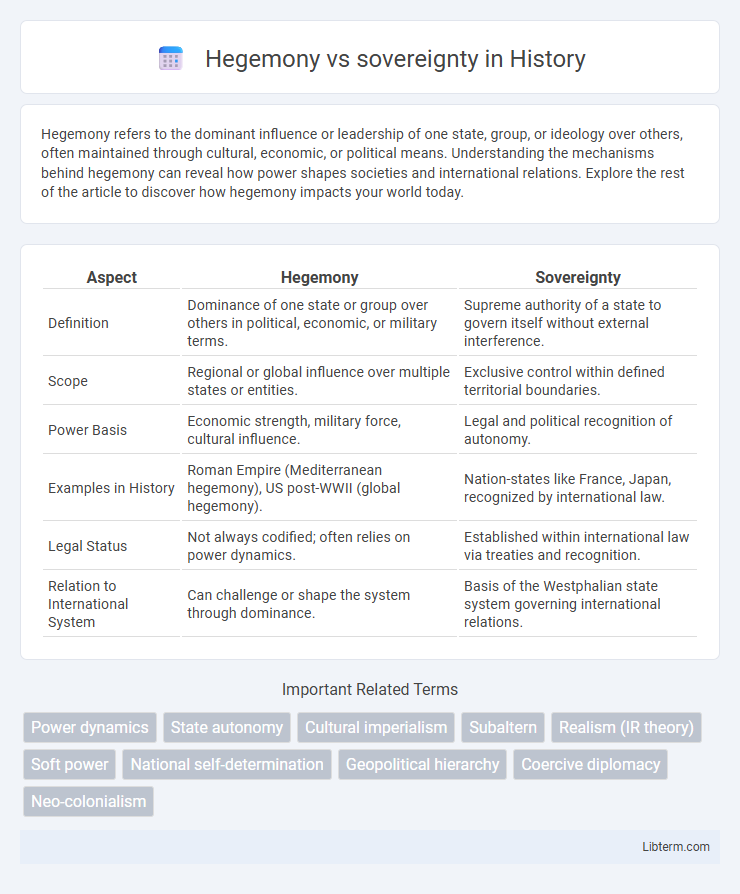Hegemony refers to the dominant influence or leadership of one state, group, or ideology over others, often maintained through cultural, economic, or political means. Understanding the mechanisms behind hegemony can reveal how power shapes societies and international relations. Explore the rest of the article to discover how hegemony impacts your world today.
Table of Comparison
| Aspect | Hegemony | Sovereignty |
|---|---|---|
| Definition | Dominance of one state or group over others in political, economic, or military terms. | Supreme authority of a state to govern itself without external interference. |
| Scope | Regional or global influence over multiple states or entities. | Exclusive control within defined territorial boundaries. |
| Power Basis | Economic strength, military force, cultural influence. | Legal and political recognition of autonomy. |
| Examples in History | Roman Empire (Mediterranean hegemony), US post-WWII (global hegemony). | Nation-states like France, Japan, recognized by international law. |
| Legal Status | Not always codified; often relies on power dynamics. | Established within international law via treaties and recognition. |
| Relation to International System | Can challenge or shape the system through dominance. | Basis of the Westphalian state system governing international relations. |
Defining Hegemony: Meaning and Origins
Hegemony refers to the dominant influence or leadership of one state or group over others, shaping political, economic, and cultural norms. Originating from the Greek term "hegemon," meaning leader or ruler, it gained prominence in international relations theory through Antonio Gramsci's concept of cultural hegemony, emphasizing consent and ideology over coercion. This form of influence contrasts with sovereignty, which denotes a state's absolute authority and independence within its borders.
Understanding Sovereignty: Core Concepts
Sovereignty represents the ultimate authority of a state to govern itself without external interference, emphasizing control over its territory, population, and legal system. Core concepts include internal sovereignty, which involves the state's monopoly on legitimate use of force within its borders, and external sovereignty, referring to recognition and autonomy in international relations. Understanding sovereignty requires analyzing how it establishes legal and political independence, distinguishing it from other forms of power such as hegemony.
Historical Perspectives: Hegemony and Sovereignty in World Politics
Hegemony in world politics historically refers to the dominance of one state or group over others, exemplified by the British Empire's global influence during the 19th century or the United States' post-World War II leadership. Sovereignty, rooted in the Peace of Westphalia (1648), emphasizes the absolute authority of states within their territorial borders and non-interference by external powers. The tension between hegemony and sovereignty shapes international relations by challenging the balance between a leading power's influence and the principle of autonomous state governance.
Key Differences Between Hegemony and Sovereignty
Hegemony refers to the dominant influence or leadership exercised by one state or group over others, often through power, coercion, or economic control, while sovereignty signifies the absolute authority of a state to govern itself without external interference. Key differences include hegemony's reliance on external control and influence beyond borders, contrasted with sovereignty's emphasis on internal political independence and legal recognition of territorial boundaries. Hegemony is often dynamic and contingent on power relations, whereas sovereignty is a foundational principle of international law ensuring state autonomy.
The Role of Power in Shaping Hegemony
Power serves as the fundamental force in establishing hegemony, where dominant states project influence to shape political, economic, and cultural norms globally. Hegemony differs from sovereignty by emphasizing control beyond sovereign boundaries through coercive and consensual mechanisms. The strength and legitimacy of power enable hegemonic states to maintain order and propagate their interests, often redefining international systems.
Sovereignty in the Modern State System
Sovereignty in the modern state system refers to the absolute authority a state holds over its territory and population, free from external interference. This principle underpins international law and diplomatic relations, ensuring that states maintain control over their internal affairs and political structures. Sovereignty also emphasizes legal equality among states, enabling them to coexist despite varying power dynamics or hegemonic influences.
Globalization: Challenging Traditional Sovereignty
Globalization challenges traditional sovereignty by diminishing state control over economic policies, cross-border trade, and information flows. Hegemony, often embodied by dominant global powers or institutions, influences international norms and enforces rules that can override national interests. This dynamic creates tensions where sovereign states must navigate external pressures while attempting to maintain autonomy in an interconnected world.
Case Studies: Hegemonic Influence vs. National Sovereignty
Case studies such as the United States' role in the Middle East illustrate hegemonic influence undermining national sovereignty by shaping local governance and economic policies to align with American strategic interests. In contrast, China's Belt and Road Initiative showcases how sovereign states negotiate terms to maintain autonomy while engaging with a hegemon for infrastructural and economic benefits. These examples highlight the ongoing tension between dominant powers imposing influence and nations striving to preserve their sovereign decision-making in global geopolitics.
Theoretical Debates: Realism, Liberalism, and Critical Perspectives
Realism emphasizes state sovereignty as paramount, viewing hegemony as a temporary power dominance shaped by material capabilities and strategic interests. Liberalism highlights the role of international institutions and cooperation, arguing that hegemony can facilitate global governance while respecting sovereign rights. Critical perspectives challenge both views by examining power structures and ideologies, suggesting hegemony often masks domination that undermines true sovereignty and political autonomy.
Future Trends: Navigating Hegemony and Sovereignty in a Multipolar World
Future trends in international relations indicate a complex navigation between hegemony and sovereignty as multiple powers rise, challenging the traditional unipolar dominance of the United States. Emerging multipolarity emphasizes the importance of balancing state sovereignty with strategic alliances, where regional powers assert greater autonomy while engaging in cooperative hegemony to influence global governance. Technological advancements and economic interdependence further reshape this dynamic, compelling states to innovate diplomatic strategies that safeguard sovereignty without undermining collective security frameworks.
Hegemony Infographic

 libterm.com
libterm.com